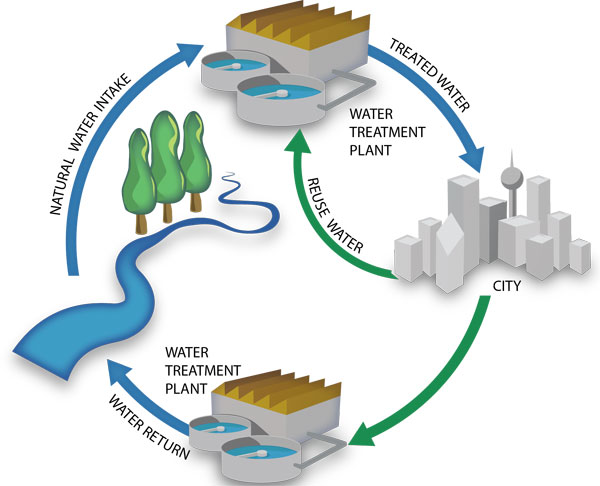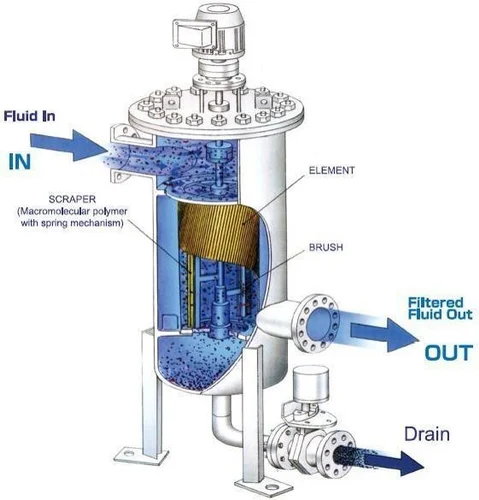Environmental Benefits of Self-Cleaning Filters
DATE:2024-09-10 Number of views: 1 Source:dongwenhui
Self-cleaning filters play an increasingly vital role in the world’s efforts to conserve water, reduce chemical usage, and promote sustainability. As environmental concerns grow across various sectors, the ability of Self-cleaning Filters to minimize water wastage and reduce the ecological footprint of industrial and municipal water treatment processes is drawing more attention. We explore how self-cleaning filters contribute to environmental protection, enhance water treatment processes, and support global sustainability goals.

How Self-cleaning Filters Contribute to Environmental Protection
At their core, self-cleaning filters are designed to operate more efficiently than traditional filtration systems. They automatically remove particles and contaminants from water without requiring frequent manual intervention. By doing so, these systems significantly reduce water wastage, eliminate the need for excessive chemicals, and improve the overall sustainability of water treatment operations. Unlike conventional filters, which often need to be replaced or cleaned manually (wasting valuable resources in the process), self-cleaning filters can operate continuously, minimizing disruptions and resource consumption.
Case Studies on the Reduction of Contaminants in Freshwater Bodies
One of the most profound environmental benefits of self-cleaning filters is their ability to reduce the presence of harmful contaminants in freshwater ecosystems. Industrial processes, agricultural runoff, and untreated wastewater are primary contributors to the degradation of water quality in lakes, rivers, and oceans. By using Self-cleaning Filters, industries can significantly lower the volume of suspended solids, heavy metals, and organic pollutants that reach these water bodies.
A case study from a large chemical manufacturing facility highlights this. By implementing self-cleaning filters in their wastewater treatment process, the facility was able to reduce the discharge of harmful chemicals into nearby rivers by 80%, significantly improving local water quality. Similarly, in agricultural operations, self-cleaning filters have been used to remove sediments and contaminants from irrigation runoff, protecting aquatic ecosystems from nutrient overloads and harmful chemicals.

Integration with Green Technologies and Energy-Efficient Wastewater Management
Self-cleaning filters are increasingly integrated with green technologies to enhance their environmental benefits further. Many modern systems are designed to work with renewable energy sources, such as solar or wind power, to drive the filtration process. This integration allows for energy-efficient operation, which aligns with the goals of reducing carbon emissions and promoting cleaner industrial practices.
In wastewater treatment plants, self-cleaning filters are also integrated into systems that aim to achieve zero-liquid discharge (ZLD). ZLD is an advanced process in which all wastewater is treated and purified for reuse, ensuring that no liquid waste is released into the environment. Self-cleaning filters play a critical role in this process by ensuring that contaminants are consistently removed without wasting additional water during cleaning cycles.
How Self-cleaning Filters Can Support Circular Economies in Water Treatment Industries
The concept of a circular economy emphasizes the reuse and recycling of resources to reduce waste and promote sustainability. Self-cleaning filters are an ideal fit for industries seeking to implement circular economy principles in their water management systems. These filters enable water to be continuously purified and reused, reducing the demand for fresh water and lowering the environmental impact of water extraction from natural sources.
For example, in the food processing industry, where large amounts of water are used for cleaning and processing, Self-cleaning Filters can filter and recycle water for reuse in non-potable applications. This not only conserves water but also reduces the need for energy and chemicals required to treat fresh water, thereby supporting a more sustainable and resource-efficient operation.

FAQ
How do Self-cleaning Filters help reduce water wastage?
Self-cleaning filters reduce water wastage by enabling continuous filtration without the need for manual cleaning or system shutdowns. Traditional filters often require large volumes of water for backwashing or manual cleaning, while Self-cleaning Filters use a minimal amount of water during their automatic cleaning cycles, leading to significant water savings.
Can Self-cleaning Filters support zero-liquid discharge operations?
Yes, self-cleaning filters are well-suited for zero-liquid discharge (ZLD) operations. They ensure that contaminants are removed efficiently, allowing treated water to be recycled and reused. This contributes to the goal of eliminating liquid waste and supports industries striving to achieve ZLD in their water treatment processes.
How do Self-cleaning Filters reduce the need for chemicals in filtration?
Traditional water treatment methods often rely on chemicals to break down or remove contaminants. In contrast, self-cleaning filters physically remove suspended particles and impurities without the need for additional chemical treatments. This reduces chemical consumption and minimizes the environmental impact associated with chemical use and disposal.
What is the environmental impact of using Self-cleaning Filters in water treatment?
The use of self-cleaning filters in water treatment has a positive environmental impact. They help conserve water, reduce chemical use, and lower energy consumption compared to traditional filtration methods. By removing pollutants more effectively and efficiently, Self-cleaning Filters contribute to cleaner water bodies and help industries comply with environmental regulations.
Can Self-cleaning Filters be used in environmentally sensitive areas?
Yes, self-cleaning filters are highly suitable for environmentally sensitive areas. Their ability to operate with minimal water and energy usage, coupled with their efficiency in removing contaminants, makes them ideal for use in areas where protecting natural ecosystems is a priority. They are especially beneficial in preserving the water quality of wetlands, rivers, and coastal regions.
Do Self-cleaning Filters comply with global sustainability standards?
Many self-cleaning filters are designed to meet global sustainability standards, such as ISO 14001 for environmental management systems. These systems are engineered to minimize waste, reduce water and energy consumption, and support sustainability goals. The technology is continuously evolving to meet the increasing demand for eco-friendly solutions in water treatment.
How do Self-cleaning Filters contribute to the reduction of pollutants in natural water bodies?
Self-cleaning filters remove suspended solids, heavy metals, organic contaminants, and other pollutants from water before it is discharged into natural water bodies. This reduces the overall pollutant load entering freshwater ecosystems, thereby improving water quality and helping to restore and preserve aquatic life.
Are there any eco-certifications available for Self-cleaning Filter technologies?
Yes, several eco-certifications are available for filtration technologies, including self-cleaning filters. These certifications recognize the environmental performance of products, particularly in terms of water conservation, energy efficiency, and pollution reduction. Systems that meet specific criteria can earn certifications that validate their contribution to environmental protection and sustainability.
In conclusion, self-cleaning filters offer numerous environmental benefits, from reducing water wastage to minimizing the need for chemicals in filtration. Their ability to operate efficiently with minimal manual intervention makes them a key technology in sustainable water management. Whether integrated with renewable energy systems or used to support circular economies, Self-cleaning Filters are essential tools for industries aiming to meet both regulatory requirements and sustainability goals. By helping to reduce pollutants in natural water bodies and supporting eco-friendly practices, self-cleaning filters are making a positive impact on global water resources.

Industry Solutions
Pure Water /Ultra Pure Water System


